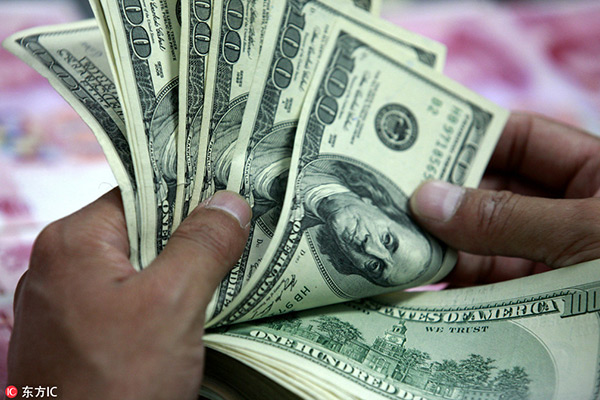Foreign currency purchase loophole closed by regulator
 |
|
A Chinese clerk counts US dollar banknotes at a bank in Huaibei city, East China's Anhui province. [Photo/IC] |
Chinese residents now need to fill an application form indicating the purpose of foreign exchange purchases, reflecting strengthened scrutiny from the nation's top currency regulator amid renewed pressure from capital flight.
The application form includes 11 purposes residents can check, including travel and medical care.
The form specifies that residents will not be approved to purchase foreign currency if they hope to make overseas purchases not yet open to domestic individuals, such as overseas housing and insurance with investment returns.
Residents who violate the rules will be put on a watch list by the currency regulator and will face cancellation of their right to buy foreign currencies for one to three year years, according to the State Administration of Foreign Exchange.
Before 2017, Chinese residents could easily buy foreign currency through official channels, including mobile banking transactions.
On Saturday, SAFE announced that more stringent supervision over the purpose of foreign exchange purchases would help close loopholes in the current system that have led to illegal transactions such as money laundering and money transfers via underground banks.
China will put more emphasis on preventing financial risks this year, People's Bank of China Governor Zhou Xiaochuan said in his New Year's remarks.
The announcement came amid speculation that the government was putting the brakes on individual purchases amid capital outflow pressures. The yuan fell by nearly 7 percent against the dollar in 2016, and analysts said it will continue to face depreciation pressure against the dollar at the beginning of this year given the dollar's recent strengthening.
But Xie Yaxuan, chief economist at China Merchants Securities, played down such speculation and said that the unchanged annual quota of $50,000 for foreign exchange purchases by individuals signals that the government does not intend to limit such currency sales.
The level of foreign assets held by Chinese residents is much lower than such holdings by residents of other countries, and is not a major concern for the government, according to Xie.
The ratio of Chinese private-sector holdings of foreign assets to GDP was 25.9 percent as of 2015, which is far lower than the G20 average of 124.7 percent, according to CEIC Data.
The regulator announced in January 2016 that it would not limit foreign currency sales to individuals, despite the pressure of declining foreign exchange reserves.
China faces less capital flight pressure than a year ago, said Yao Yang, a professor of economics at Peking University. Yao does not expect the government to impose short-term restrictions on individual foreign exchange purchases. "Restriction does not help stabilize market expectations, but may trigger more capital flight," he said.























